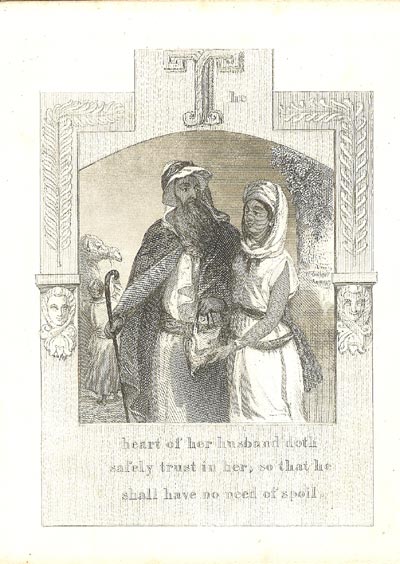























THE HEART OF HER HUSBAND DOTH SAFELY TRUST IN HER,
SO THAT HE SHALL HAVE NO NEED OF SPOIL.

The perfect confidence described in this verse, implies not only a conviction of simplicity and guilelessness of character in the wife, but it also assures us of her discretion. No man could safely trust in one whose conduct was not unspotted in all her intercourse with society. The heart of her husband had no care, lest by any unguarded act, any imprudence on her part, she should bring a reproach upon his name, or a sorrow into his bosom. Such a woman must have shunned even the appearance of evil. She must have acted on the principle of the Hebrew proverb, "A good name is better than precious ointment, and loving favour to be chosen rather than choice gold;" and, by the uniform consistency of a virtuous life, have gained the entire confidence of him who best knew her character.
But while the text implies this, yet it mainly refers to the assurance entertained by her husband, of her care and skill in the management of her household. Archbishop Cranmer renders this passage, "So that he shall fall into no poverty," and Boothroyd translates it,"And of his property he will not be deprived." The Septuagint Version understands the word spoil, as referring to the woman, and not to her husband, "Such an one as she shall not want good spoils." But, in any case, it signifies that provident care and management, that looking after the concerns of her family, for which we find her so often commended throughout the poem.
The need of spoil must be explained by a reference to the usage of the Hebrews, at this period of society. The Israelites had often obtained spoils in their encounters with neighbouring nations. The reign of David had been occupied by continual warfare. The pastoral community at this time were not a tribe of idle shepherds, but those who had been men of war from their youth; and their frequent expeditions were regarded as acts of retaliation, for similar offences, from the herdsmen of neighbouring tribes. Saul and David had been great warriors; and, under the latter king, the Israelites had been so trained to military discipline, that they appear to have been always victorious in the field, and are frequently represented as sharing that spoil which in the more peaceful days of Solomon was less generally enjoyed. The first public act of Saul had been a battle against Nahash the Ammonite; and in the description of the spoil taken, when Saul and Jonathan, and all the Hebrews, encountered the Philistines, we see the nature of the wealth gained by the Israelites. In the narrative given in 1 Samuel 15, we find that the people flew upon the spoil, and took sheep and oxen and calves. And when, in the following chapter, we read that Saul fought against the Amalekites, and sinned against Jehovah, by appropriating, as spoil, those things which he had commanded him to destroy, we find enumerated the sheep, and oxen, and lambs, which formed the wealth of a pastoral people.
But if Saul, as had been sung by the Hebrew maidens, had slain his thousands, David had slain his tens of thousands, and the records of his life display how much wealth had been gained by the Israelites from their enemies. At the time when David, driven from his home by the jealousy of Saul, wandered with his men to the wilderness of Paran, they probably supported themselves by spoil gathered from the tribes who came down upon the shepherds of the land. The narrative of Nabal's churlishness refers to David's protection of the herdsmen from incursions of this nature; for when their unthankful master refused his help to the wanderer, the young men told Abigail, and said of David's host, "They were a wall unto us both by night and day, all the while we were with them keeping sheep" (1Sa 25:16). And now when peace was in Israel generally, yet in adjacent countries the same practices were continued, and the man who sought to be rich, often shared the spoil taken from others.
But in the case of this Jewish family there was no need of such spoil. Industry supplied the household wants, and care kept that from waste which industry had gathered, and the husband had no occasion to go out to the warfare. Under the shadow of his own vine and his own fig‐tree, he could enjoy the blessings of a peaceful life; and in his earthly home could find that love and quietness, which might prove the best foretaste that earth can give of the heavenly home to which he was tending.
The Blue Letter Bible ministry and the BLB Institute hold to the historical, conservative Christian faith, which includes a firm belief in the inerrancy of Scripture. Since the text and audio content provided by BLB represent a range of evangelical traditions, all of the ideas and principles conveyed in the resource materials are not necessarily affirmed, in total, by this ministry.
Loading
Loading
| Interlinear |
| Bibles |
| Cross-Refs |
| Commentaries |
| Dictionaries |
| Miscellaneous |
